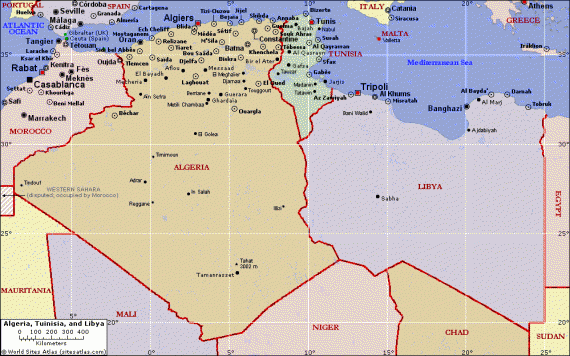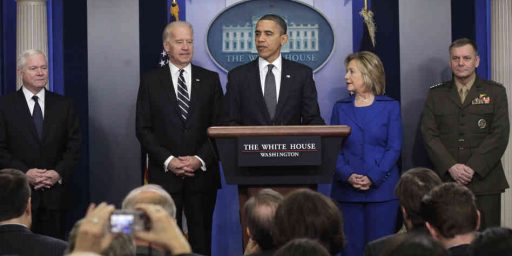Robert Gates Admits Libya Is Neither A Threat, Nor A Vital National Interest
Robert Gates and Hillary Clinton made a tour of most of the morning shows today to talk Libya, and on more than one occasion the Defense Secretary seemed to discount the importance of Libya to the United States:
Secretary of Defense Robert Gates said that Libya did not pose a threat to the United States before the U.S. began its military campaign against the North African country.
On “This Week,” ABC News’ Senior White House Correspondent Jake Tapper asked Gates, “Do you think Libya posed an actual or imminent threat to the United States?”
“No, no,” Gates said in a joint appearance with Secretary of State Hillary Clinton, their first since the Libya operation began. “It was not — it was not a vital national interest to the United States, but it was an interest and it was an interest for all of the reasons Secretary Clinton talked about. The engagement of the Arabs, the engagement of the Europeans, the general humanitarian question that was at stake.”
Of course, even if you take Gates at his word regarding other interests that were involved, that doesn’t lead to the conclusion that American military action is justified, especially when that action takes place solely on the whim of the President without any consultation with, or debate by Congress. We’re already engaged in two wars, do we really need to be involved in a third when our interests aren’t even implicated? I can’t see how the answer can possibly be yes.







Next paragraph in the piece:
I agree it’s not a vital US interest, it’s a humanitarian interest, an interest in not allowing Gaddafi to establish a template for other Arab governments, and an interest in protecting a couple of local allies and broader stability.
Can we use the military for less than vital interests? We have in the past: Grenada, Haiti, Somalia. And of course we use them for straight humanitarian missions like Indonesia and now Japan.
I assume no one has objection to us sending the Navy — without Congressional debate — on purely humanitarian grounds to Japan. So I assume the difference here rests on the use of force in a humanitarian operation.
“that doesn’t lead to the conclusion that American military action is justified, especially when that action takes place solely on the whim of the President without any consultation with, or debate by Congress”
As we have seen time and time again, from the USS Maine all the way up to Curveball, “justifying” American military action is as easy as manufacturing a casus belli. In this particular case, the UN mandate and our lead role within NATO more than justifies our involvement. Indeed, air strikes is one step above doing nothing. And thanks to that UN mandate and our leadership role in NATO, doing “nothing” isn’t really a viable option.
That’s not to say I’m personally supportive of what we’re doing in Libya. It’s just that my personal disapproval does not mean this action is “unjustified.”
I actually thought Clinton rebutted this point fairly well on Meet the Press. She pointed out that responding to the 9/11 attacks wasn’t really a vital interest for many of our NATO allies that joined in the Afghanistan invasion. Yet they came in and assisted their ally, the US.
If the events in Libya are a vital interest for our European allies, we should consider helping them as they helped us.
I’m still not sold on the whole idea, but I found her rationale somewhat persuasive. I won’t be able to fully support the US involvement, though, until somebody defines success. Supporters seem to love to talk about why we went in, but don’t really like to talk about how we get out.
Gates explained that there was more at stake. “There was another piece of this though, that certainly was a consideration. You’ve had revolutions on both the East and the West of Libya,” he said, emphasizing the potential wave of refugees from Libya could have destabilized Tunisia and Egypt.
Thanks, Michael. Another parallel with Iran. When the aborted Green Revolution was attempted, the US had sizable military presences not only to the east and west, but the south as well.
J.
Not sure there’s much equivelancy between Libya and 9/11… NATO signatories are obliged to treat an attack on one as as an attack on all. What treat obligation supports Libya? Not saying there aren’t reasons, that’s just not a very good justification.
This isn’t too surprising to those of us who read it that way, from the beginning.
I think some of the comments here are missing the point that Mataconis is making here. The use of military force by the United States may be legal/permissible/appropriate in situations in which a vital national interest is not at stake. I think there’s broad consensus on that point. The problem is Obama’s refusal to ask Congress for authorization first. Whether whatever it is we’re doing in Libya is necessary to protect a vital national interest is a separate question from whether the president needs Congressional authorization first.
SLK, I think we are just less advanced than we pretend to be.
Was Nixon impeached for bombing Cambodia? Or did people just squawk about it, and finally threaten to impeach him for something much more minor?
Same Clinton. He bombed, but it was a skirt that almost brought him down.
Mrx Clinton invents a serurity threat in Libya, while she green lights gunning down demonstraters in Syria. Alas the price we pay for Mrs. Clinton’s smart diplomacy.